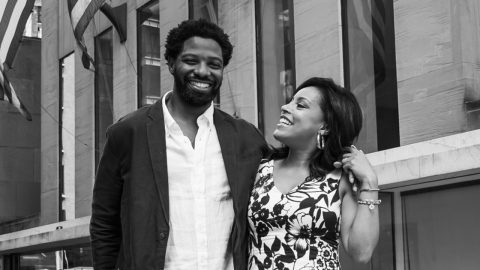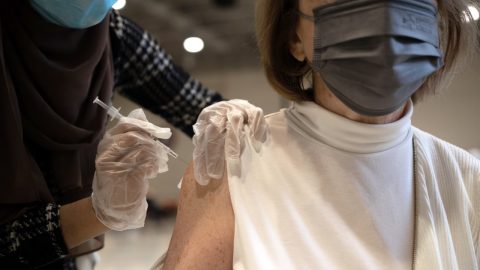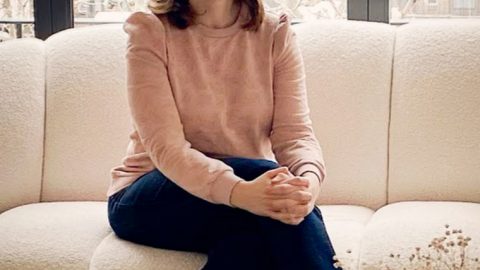
Madison Shaw left college in Boston for an online classroom as Covid spread in 2020 because she’s immunocompromised. She also had to flee New York City the following year as infection rates skyrocketed there again.
Now 22 and having lived in Newport, Rhode Island, for a few months, Shaw said she’s wondering where she can find refuge next. Finding a safe place to live and work with common variable immunodeficiency — a condition that limits her body’s ability to produce antibodies and fight infections — is difficult outside of a pandemic.
Right now, however, it’s becoming near impossible. Even as the country’s Covid rate remains high and nearly 100 people continue to die each day from the virus, the small comfort she found in mask mandates that some states’ maintained and that provided a level of protection from spreading Covid are beginning to fall like dominoes.
California, Connecticut, Delaware, New Jersey, New York and Oregon announced this week that they were easing or ending the mask mandates that they had kept while much of the country moved on.
Shaw’s governor in Rhode Island also announced that he is planning to reconsider the state’s mandate next week.
“Masks, after the vaccine, were the final protection that allowed us to participate in certain activities and going out in public,” Shaw said. “Those being lifted kind of brings you back to a place pre-vaccine, almost that same level of safety, which is extremely limiting in allowing me to meet my basic needs. I’m talking about going to the grocery store, doing remote work in cafes, trying to enter the job market or even an office space.”
Across the country, immunocompromised people, the disabled and the elderly are watching as states relinquish a requirement that compelled all members of the community to protect themselves and each other.
Many members of those groups said it left them feeling frustrated, angry, disappointed and even lonely, as if the entire country was deciding to move on without considering those who are at most risk of severe illness or death by Covid.
The feeling among many was that state governments were making a political decision, rather than one based on facts and science.
“We know lifting the mask mandates isn’t the safest thing, especially if you follow science,” said Elizabeth Griest, the mother of two immunocompromised kids in Connecticut. “I was hoping they would take that into account, that Covid is still very real whether there’s Covid fatigue or not. I mean, it still frightens me today like it did the first day of the pandemic because of the kids’ illnesses.”
Even before the pandemic, her family had to act cautiously, socially distancing themselves when necessary and keeping masks and sanitizers close at hand. The idea that others are tired of wearing a mask is understandable, said Griest, but it’s the reality of keeping people safe.
It’s particularly hard for Griest to stomach because her school-aged children are back in the classroom. She did not want her kids to go back to in-person learning, but Connecticut did not offer a virtual option. Soon, there won’t be a mask mandate either, and Griest said her children felt stuck and scared.
“It’s terrifying because I want to see my kids live every single day, and they’re taking that out of my control,” she said.
Advocates for the disabled and immunocompromised in states that recently lifted their mandates or did away with them long ago said that it’s driven members of their communities to be even more alone and disconnected from society.
Jeremy Maxand, the executive director at Living Independence Network in Idaho, said that it has been difficult to ask members of the disabled community to advocate for vaccines or masks because of the vitriol and harsh rhetoric that many have faced in the state when speaking about their hopes of doing more to protect people from Covid.
“People come up and literally say that they’re not responsible for a [disabled] person’s well-being,” Maxand said, reflecting on how residents of Idaho, a rural state, rely on one another. “It just is like we have done a 180 in terms of how we think and care about one another.”
One additional concern for many is that ending mask mandates is just another step toward leaving the disabled, immunocompromised and elderly behind as the country tries to move past the pandemic.
Julie Reiskin, the executive director of the Colorado Cross-Disability Coalition, said that people she works with are concerned about what comes next. For almost two years, members of her community have been able to work from home, visit the doctor through telehealth and protect themselves while meeting those basic needs.
“You can say, maybe right now, it’s OK. People are still able to stay home and do things remotely if they need to, but if people are told they need to go back to work in-person, need to go to the doctor’s office, need to send their kids to school without masks, it gets to be more concerning,” she said.
“The question is: What comes next?” Reiskin added. “When does this all change again?”










Recent Comments